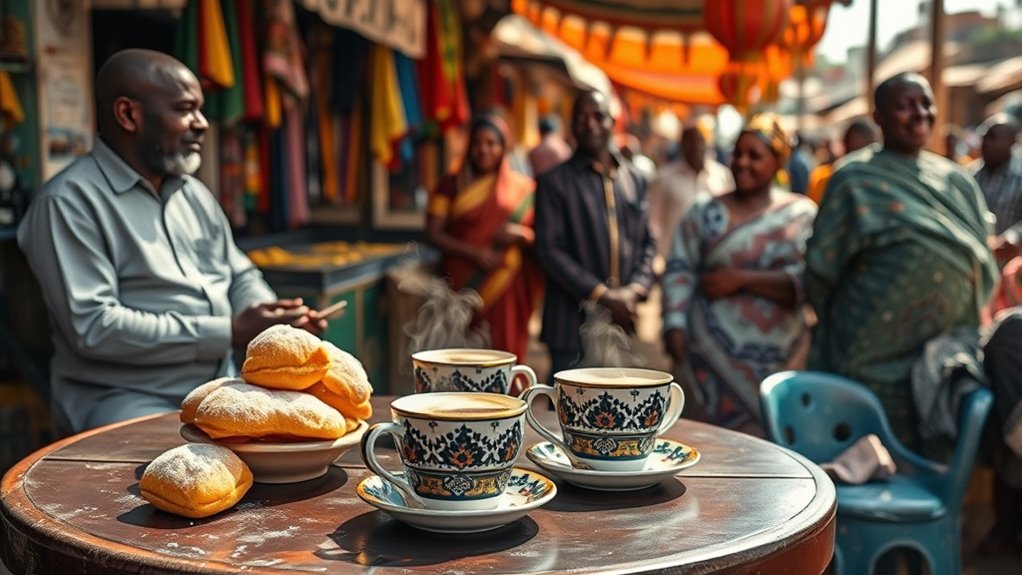In Senegal, enjoying Café Touba and beignets is a vibrant social ritual rooted in community and spirituality. You’ll see locals grinding spices and brewing tea over open flames, sharing small cups as acts of hospitality. Beignets are made from fermented dough, deep-fried to golden perfection, and served with friends at busy markets or cafés. Exploring these traditions offers a taste of Senegal’s warm culture—there’s so much more to discover about these lively routines.
Key Takeaways
- Café Touba is traditionally brewed by grinding guinea pepper and coffee, boiling over open flames, and sharing in small cups as community rituals.
- Beignets are prepared through regional variations, involving fermenting dough, deep-frying, and serving as symbols of celebration and hospitality.
- Both beverages and treats are central social hubs, fostering community bonds through shared routines, conversations, and cultural exchange.
- Serving Café Touba and beignets often involves communal gatherings, religious events, and lively markets that emphasize hospitality and togetherness.
- Visitors can immerse themselves by participating in local customs, enjoying traditional brewing, and engaging with vendors in vibrant Senegalese neighborhoods.
The Origins and Significance of Café Touba
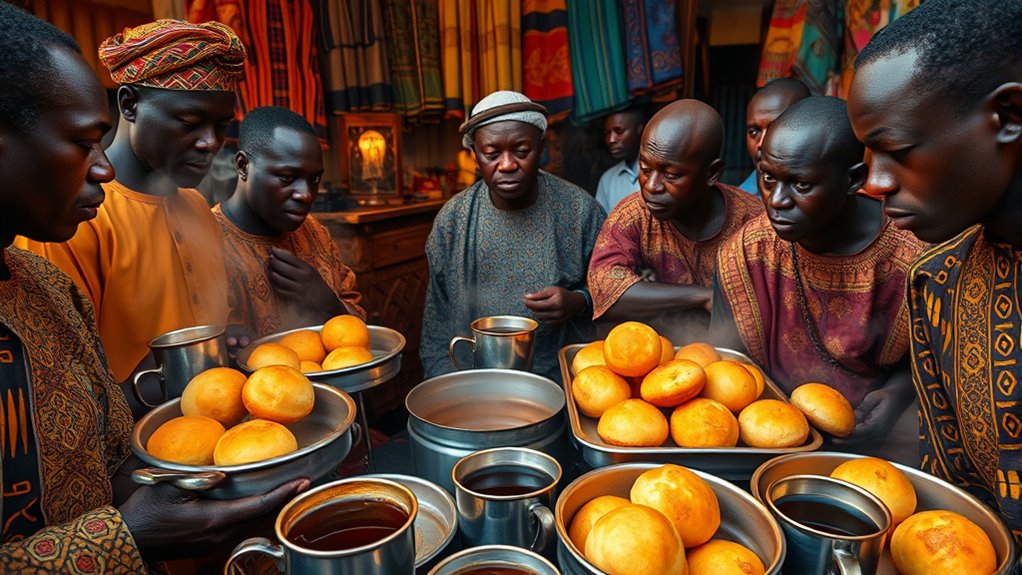
Café Touba holds a special place in Senegalese culture because of its deep historical and spiritual roots. You might not realize it, but drinking Café Touba is more than just a daily habit; it’s a tribute to the country’s religious heritage. The coffee was introduced by Sheikh Ahmadou Bamba, the founder of Mouride Brotherhood, in the late 19th century. It represents faith, resilience, and community. The unique blend of roasted coffee beans and bold spices, especially Guinea pepper, was created to honor spiritual traditions. Over time, Café Touba became a symbol of unity and identity for Senegalese people, transcending social and ethnic boundaries. Today, it’s a cultural staple that continues to connect individuals to their history and spirituality. Incorporating traditional brewing methods enhances the cultural significance and authentic experience of enjoying Café Touba. Additionally, understanding the economic impact of such cultural practices can offer insights into how local traditions influence national identity. Moreover, the preparation process often involves specialized techniques that preserve the beverage’s cultural authenticity and deepen its significance. Recognizing the cultural symbolism behind Café Touba also highlights its role as more than just a beverage, but a profound expression of Senegalese heritage and faith. Furthermore, embracing local ingredients helps sustain traditional practices and supports local farmers.
The Ritual of Brewing and Drinking Café Touba
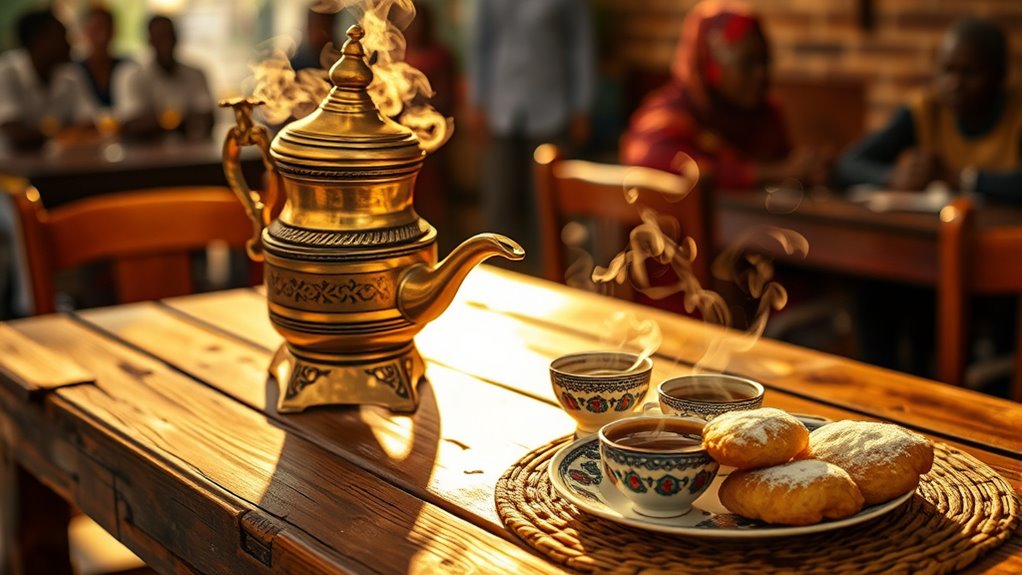
When you prepare Café Touba, you follow specific brewing traditions that honor its cultural roots. Each sip carries deep significance, connecting you to Senegalese community and faith. This ritual transforms drinking coffee into an experience beyond taste. Engaging in this process reflects the broader importance of cultural rituals in maintaining community identity and spiritual practices. Incorporating mindful practices into this tradition can deepen your appreciation and foster a more meaningful connection to the ritual. Paying attention to safe coffee preparation methods can also enhance the overall experience and safety of your brewing process. Understanding the traditional brewing techniques helps preserve the authenticity of Café Touba. Embracing these traditions with full attention can further enrich the cultural significance of the ritual.
Brewing Ceremony Traditions
In Senegalese culture, the brewing and drinking of Café Touba is a cherished ritual that brings people together and reflects deep spiritual and social values. You begin by grinding the fragrant grains of guinea pepper and coffee, blending them carefully. The mixture is then boiled in a traditional pot, often over an open flame, filling the air with rich aromas. As the brew simmers, you may add a touch of sugar or other spices, depending on local customs. The ritual is performed with intention and respect, often accompanied by prayer or moments of reflection. Once ready, you pour the hot coffee into small cups, sharing it with others as a sign of community and hospitality. This ceremony emphasizes patience, reverence, and connection. Incorporating eco-friendly practices, such as using sustainable utensils or locally sourced ingredients, can further honor the cultural significance of the tradition. Understanding the importance of cultural preservation can help maintain these meaningful customs for future generations.
Cultural Significance of Sip
The act of sipping Café Touba embodies more than just enjoying a flavorful beverage; it is a powerful symbol of community, spirituality, and respect. When you take that first sip, you participate in a tradition deeply rooted in Senegalese culture. It’s a moment to connect with others, share stories, or reflect quietly. The ritual of drinking Café Touba often signifies hospitality and reverence, especially during gatherings or religious events. Each sip is a reminder of the city’s spiritual heritage, honoring the teachings of the Mouride brotherhood. As you enjoy the coffee, you’re engaging in a practice that transcends taste—it’s about unity, tradition, and honoring Senegal’s communal identity. Your participation in this ritual keeps these cultural values alive and meaningful. Additionally, understanding the 16PF personality traits can offer insights into how individuals might experience and appreciate such cultural rituals differently.
Beignets: A Sweet Tradition in Senegalese Culture
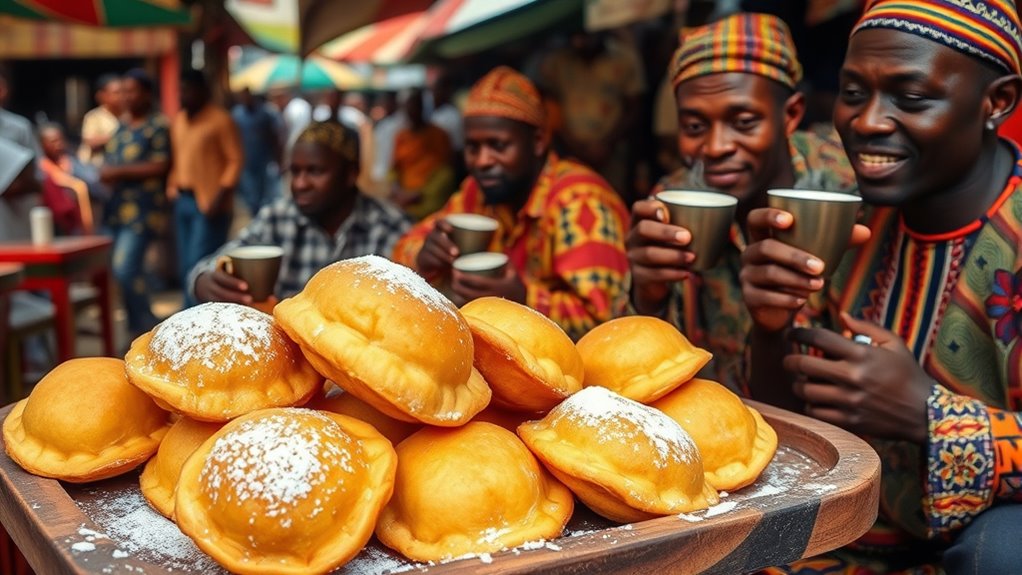
Beignets hold a special place in Senegalese culture, symbolizing celebration and community. You’ll find that their preparation varies across regions, reflecting local ingredients and traditions. Exploring these differences reveals how beignets connect people through shared history and flavors. Additionally, understanding diversification of ingredients and techniques can deepen appreciation for this cultural delicacy. The use of local ingredients often influences the flavor profiles and presentation styles, showcasing regional identities.
Beignets’ Cultural Significance
Because they are more than just a sweet treat, beignets hold a special place in Senegalese culture, symbolizing hospitality, community, and celebration. When you share beignets with family or friends, you’re expressing warmth and welcoming others into your life. During festivals and special occasions, offering beignets signifies unity and joy, creating bonds that strengthen social ties. They serve as a symbol of generosity, showing that you value relationships and community. Beignets also connect generations, passed down through families as a cherished tradition. Eating beignets isn’t just about the flavor; it’s a cultural act that highlights Senegalese values of togetherness, sharing, and celebration. This deep-rooted significance makes beignets more than a dessert—they are a reflection of Senegalese identity.
Preparation and Ingredients
Preparing beignets involves a simple yet precise process that highlights the importance of fresh ingredients and careful technique. You start by gathering:
- Flour, sugar, and yeast for the dough’s base
- Warm water or milk to activate the yeast
- A pinch of salt and optional flavorings like vanilla or nutmeg
Mix these ingredients thoroughly until smooth. Allow the dough to ferment until it doubles in size, which develops the flavor and texture. Once ready, you shape the dough into small balls or strips. Deep-fry these in hot oil until they turn golden brown and puff up. Drain excess oil on paper towels before serving. Using fresh ingredients and maintaining consistent heat are key to achieving the perfect, airy beignets that are a beloved part of Senegalese tradition. Fermentation process is essential for developing the dough’s flavor and lightness.
Variations Across Regions
Across Senegal, different regions put their unique spin on beignets, reflecting local tastes and cultural influences. In Dakar, you might find beignets with a touch of vanilla or nutmeg, adding a subtle aroma. In the Casamance area, beignets often incorporate coconut, giving them a richer flavor. The eastern regions sometimes add spices like cinnamon or cardamom, making each bite more aromatic. Some communities prefer their beignets lighter and fluffier, while others favor denser, more filling versions. Variations also exist in serving styles—some serve them dusted with powdered sugar, others dip them in sweet syrup or honey. These regional differences showcase the diversity of Senegalese cuisine and your ability to experience a different flavor profile with every bite.
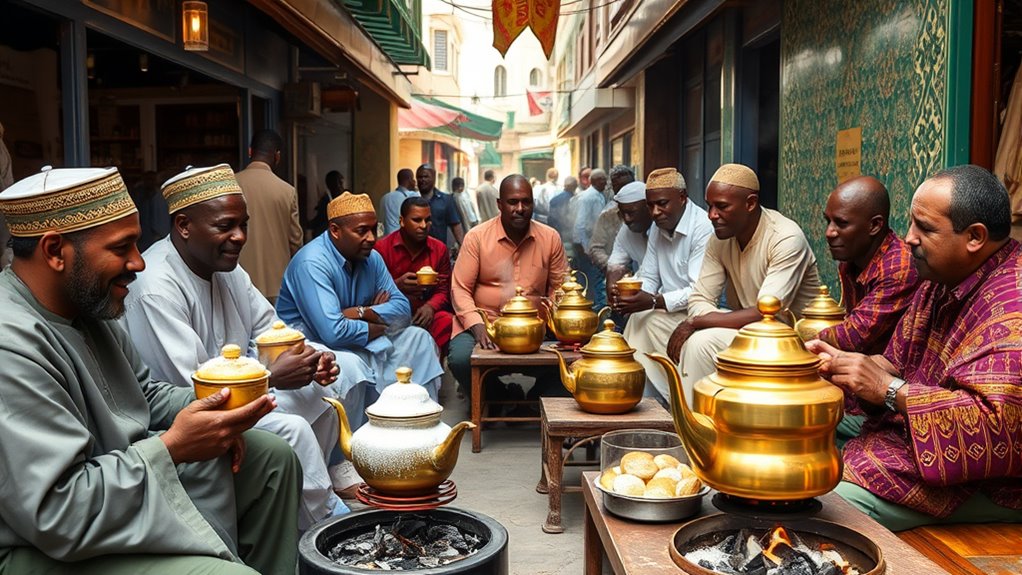
In Senegal, café Touba and beignets serve as more than just tasty treats; they create vibrant social hubs where communities gather to connect and share stories. When you visit these spots, you’ll notice lively scenes:
- Men and women sitting together, sipping coffee or tea, engaging in animated conversations.
- Vendors preparing fresh beignets, filling the air with a sweet, inviting aroma.
- Groups playing cards or dominoes, laughing and debating passionately.
These spaces aren’t just about consumption; they foster relationships and cultural exchange. The rhythmic sounds of conversation, the clatter of cups, and the aroma of roasted coffee define these communal spots. Here, social bonds strengthen over shared routines, making each visit more than just a quick snack.
Additionally, understanding the importance of social spaces in fostering community ties can enrich your experience and appreciation of Senegalese culture.
The Role of Community and Hospitality in the Routine
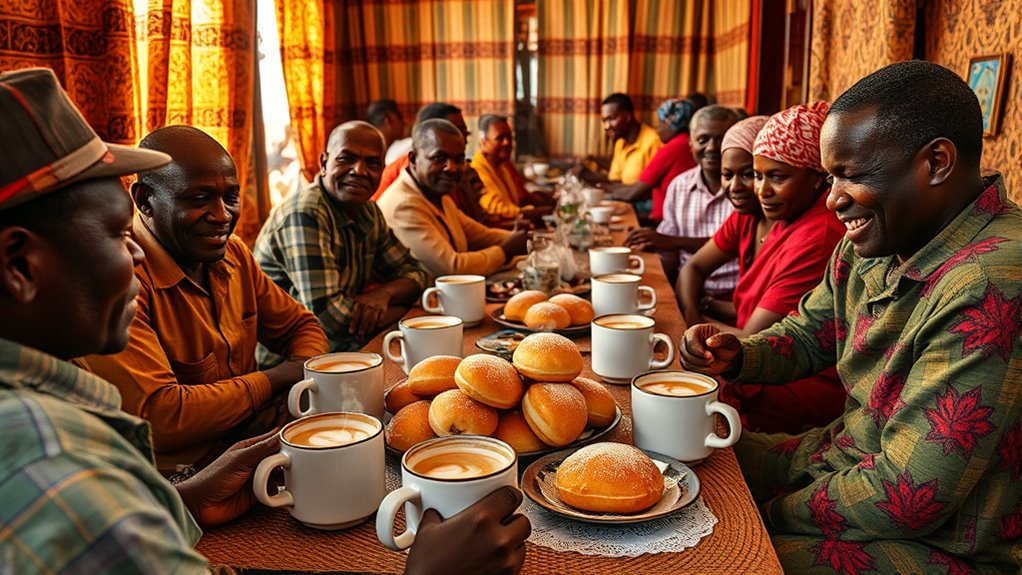
Community and hospitality are the heartbeat of Senegalese café Touba and beignet routines, where shared spaces foster genuine connections. When you step into these lively settings, you become part of a tradition that values warmth and openness. People greet each other like family, exchanging smiles, stories, and laughter over steaming cups of Touba or freshly fried beignets. These routines aren’t just about food—they’re about building bonds and strengthening social ties. Hosts go out of their way to make everyone feel welcome, creating an atmosphere of trust and camaraderie. You’ll notice that, here, every visit becomes an opportunity to connect, share, and celebrate community spirit, making the experience more than just a meal—it’s a meaningful social ritual. Recognizing the importance of community and support can deepen your appreciation for these cultural practices. This emphasis on cultural identity highlights how food routines serve as vital expressions of national and local traditions. Additionally, these practices often incorporate elements of spiritual connection, reinforcing the sense of unity and shared purpose among participants. Building a sense of trust and camaraderie is fundamental in maintaining the vibrant social fabric of these gatherings. Moreover, the sharing of traditional foods like Touba and beignets helps preserve and transmit cultural heritage across generations.
Experiencing the Cultural Atmosphere: Tips for Visiting Senegal
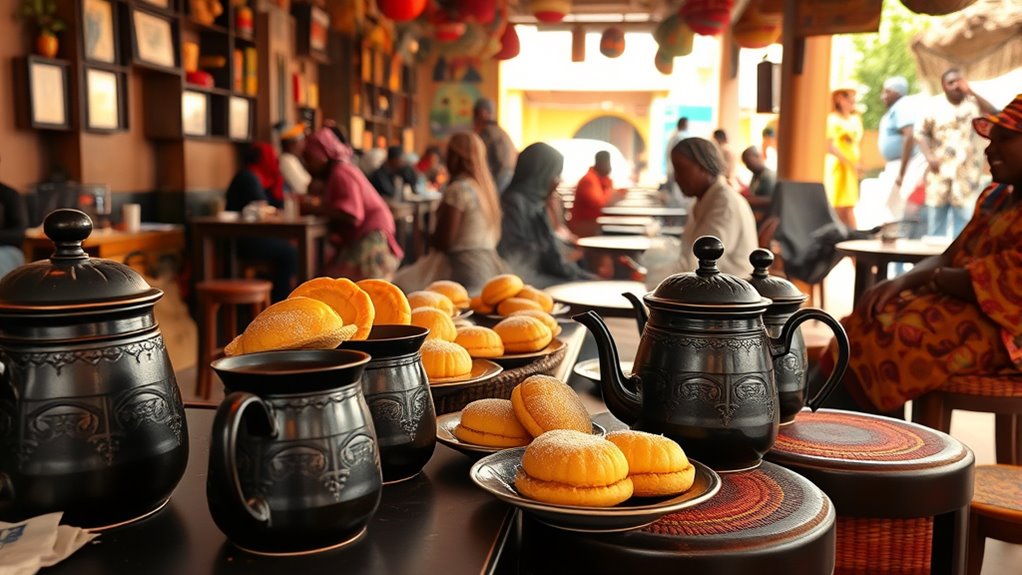
To truly experience Senegal’s vibrant cultural atmosphere, it’s essential to immerse yourself in local customs and daily routines. Start by visiting bustling markets where the aroma of spices, fresh produce, and roasted peanuts fills the air. Next, join locals in a café for a traditional cup of Touba, savoring its unique blend of flavors and the communal vibe. Finally, explore neighborhoods on foot, observing daily life unfold—from families sharing meals to children playing in the streets. Engage with vendors and ask questions about their crafts or food, showing genuine interest. These small interactions and immersive experiences help you connect with Senegalese culture beyond tourist sights, revealing the rich traditions and lively spirit that define everyday life in Senegal.
Frequently Asked Questions
What Variations of Café Touba Exist Across Senegal?
You might wonder about the variations of café Touba across Senegal. While the core recipe remains consistent—robust, spiced, and traditionally prepared with guinea pepper—locals often add their own twists. Some prefer it stronger or milder, with extra sugar or milk, while others incorporate different spices like cloves or ginger. These subtle changes reflect regional tastes and personal preferences, making each cup unique yet rooted in the tradition of Senegalese coffee.
How Do Age and Gender Influence Café Touba and Beignet Traditions?
Imagine your age and gender hold the power to open secret recipes and traditions! As you grow older, you might find yourself savoring café touba and beignets with more reverence, turning rituals into cherished memories. Gender influences who prepares, shares, and celebrates these treats, making the experience uniquely yours. Your age and gender shape how deeply you connect with these flavors, transforming simple routines into vibrant cultural stories you carry forever.
Are There Specific Festivals Celebrating Café Touba and Beignets?
You might find that local festivals celebrate unique culinary traditions, including coffee and fried treats. These events often showcase cultural pride, bringing communities together to enjoy special foods and drinks. During these festivals, you participate in lively gatherings, tasting various preparations and learning about their significance. Such celebrations highlight the importance of these foods in cultural identity, making them more than just everyday items—they become symbols of tradition and community spirit.
How Has Modern Culture Impacted Traditional Routines?
You notice that modern culture influences traditional routines by blending old practices with new trends. You might find younger generations using social media to share their routines or adapting traditional foods to fit contemporary tastes. Technology and globalization make these routines more accessible and flexible, encouraging innovation. While these changes can preserve cultural identity, they also challenge the preservation of authentic, time-honored customs.
Can Tourists Participate in Local Café Touba and Beignet Rituals?
You can definitely participate in local café Touba and beignet rituals. Tourists are often welcomed by locals and encouraged to join in these communal activities. You might help prepare or simply observe and enjoy the experience. Engaging in these routines gives you a deeper understanding of the culture. Just be respectful, open-minded, and show appreciation for the traditions, and you’ll find yourself immersed in authentic local life.
Conclusion
As you immerse yourself in Senegal’s café touba and beignet routine, you’ll discover it’s more than just a tradition—it’s a vibrant social fabric. Did you know that over 60% of Senegalese people enjoy coffee daily? Embrace the warm hospitality and lively atmosphere, and you’ll experience firsthand how these rituals foster a deep sense of community. So, savor every sip and bite; these moments connect you to Senegal’s rich cultural heartbeat.
